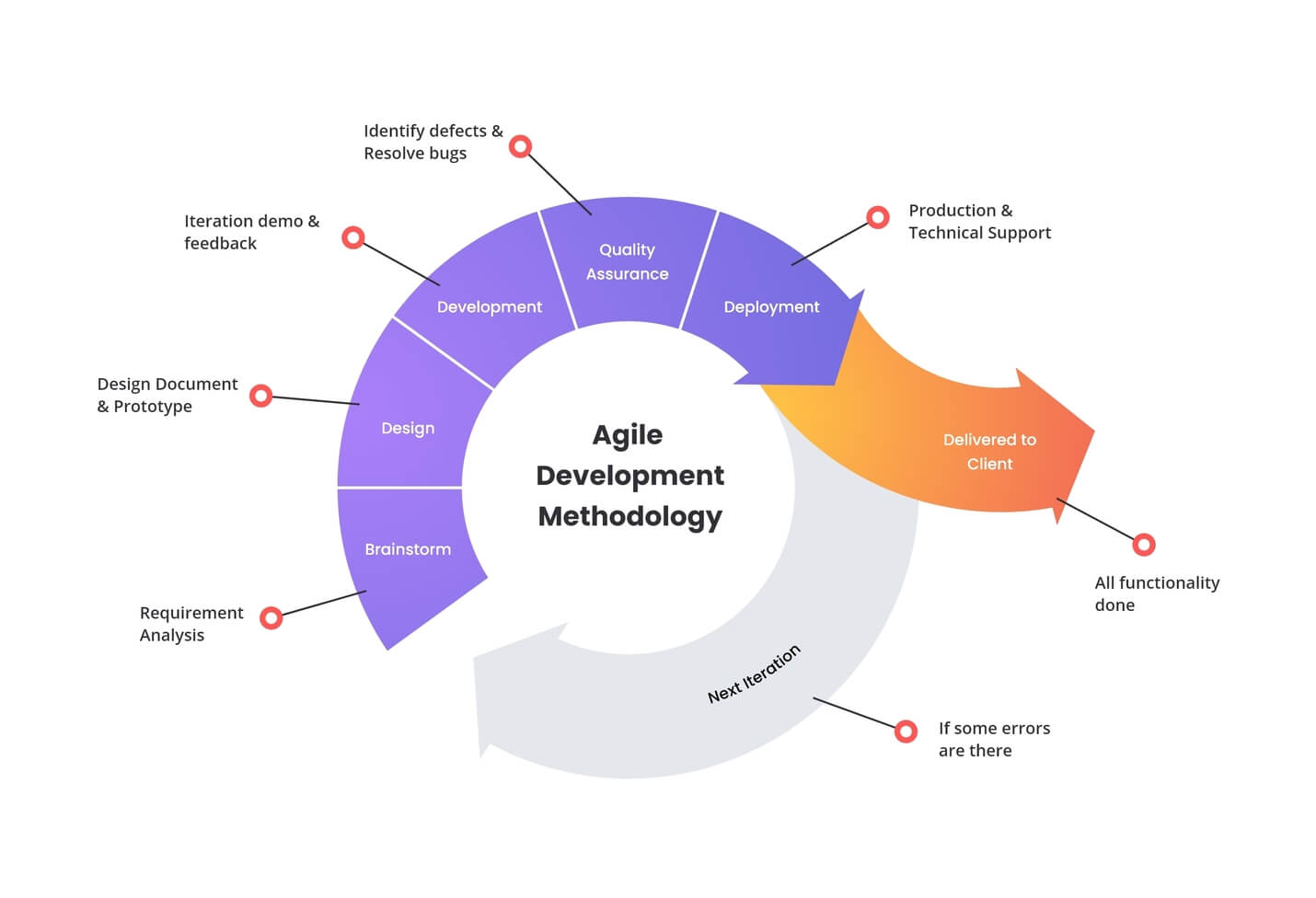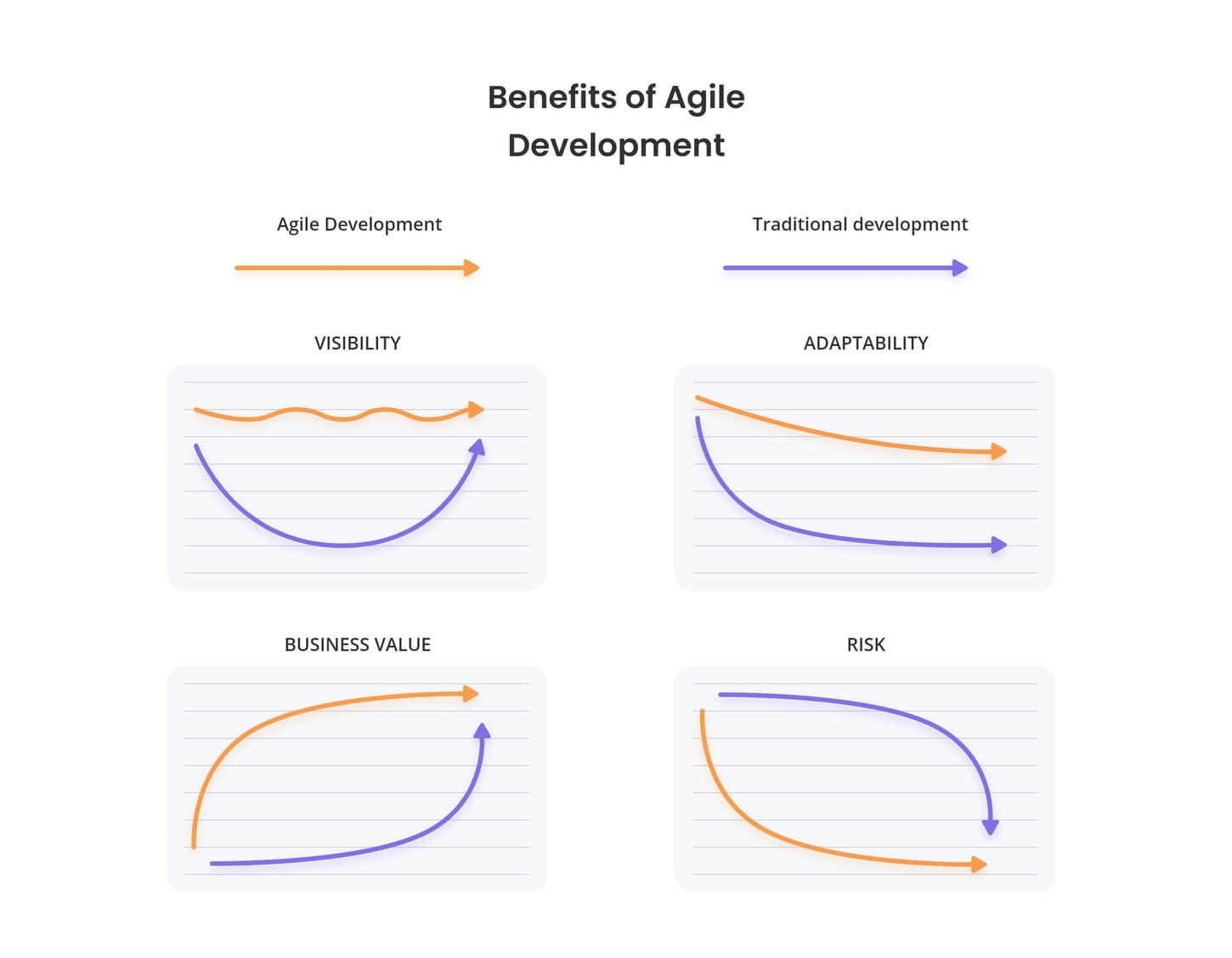To understand agile software development, we must understand a few basics first. The ability to create and respond to change is referred to as agile. It is a method of dealing with and eventually succeeding in an unpredictable and turbulent environment. The creators of the Agile Manifesto selected the term “Agile” to symbolize the adaptability and responsiveness to change that was so essential to their methodology.
It’s basically about finding out how to comprehend what’s going on in the environment you’re in right now. Also, recognizing the uncertainty you’re facing, and figuring out how to adjust to it as you go.
From the above explanation, it is clear that the Agile approach is more flexible and helpful for startups. Startup development companies encounter many difficulties throughout the software development process, but Agile can eliminate many of them.
Let’s get to know Agile a little better so that startups can get the big picture before knowing its benefits.
What Exactly Does Agile Software Development Entail?
Agile software development is more than Feature-Driven Development (FDD), Scrum, or Extreme Programming frameworks. Agile software development entails something more than practices like test-driven development, pair programming, stand-ups, planning sessions, and sprints.
The term “agile software development” refers to a collection of concepts and techniques based on the ideals and principles stated in the Manifesto for Agile Software Development and the 12 Principles that underpin it. When approaching software development in a certain way, it’s usually a good idea to live by these principles and values. The development team must also use them to figure out the best things to do are given your specific situation.
What Makes Agile Unique?
One feature that distinguishes Agile from other software development methods is the emphasis on the people performing the job and how they collaborate. Collaboration amongst self-organizing cross-functional teams using the right techniques for their context leads to the development of solutions.
The Agile software development community places a high value on collaboration and the self-organizing group. That is not to say that there are no managers. It implies that teams can find out how to tackle problems on their own. It suggests that such teams are multi-functional. Those teams do not need to have particular responsibilities. But rather that when you put the team together, you ensure that you have all of the necessary skill sets on the team.
Managers are still in demand, and they ensure that team members have or acquire the necessary skill sets. Managers foster an environment that enables the team to succeed. And they generally stand aside and allow their teams to figure out how to deliver products. However, they step in when teams attempt but fail to address problems.
When most teams and companies begin using Agile development, they focus on techniques that aid in collaboration and task organization. Specific technical procedures that directly deal with creating software that helps your team cope with uncertainty are another important set of practices that are not as often followed but should be. Those technical procedures are critical and should not be overlooked.
What are Agile Methodologies?
Agile is a mindset influenced by the ideals and principles of the Agile Manifesto. These values and principles influence how we create, react to, and cope with change and uncertainty. So, if Agile is a mindset, what does that mean for the concept of Agile methodologies?
One of the founders of the agile movement in software development, Alistair Cockburn, said that a methodology is a collection of conventions that a team decides to follow. That implies that each team will have its methodology, which will vary in minor or major ways from the methodologies of the other teams.
So, Agile methods are the conventions that a team decides to follow to adhere to Agile ideals and principles.

Agile Software Development’s Advantages for Startups
1. Transparency
An Agile methodology facilitates customer engagement throughout the project, from feature prioritization through iteration planning and review meetings to frequent software build including new features. But in return for the additional advantage of openness, customers must understand that they see a work in progress.
2. It Focuses on Users
User stories with business-focused acceptance criteria are frequently used in Agile to create product features. By emphasizing features on the requirements of actual users, each feature progressively delivers value rather than simply being an IT component. And this also allows for the chance to beta test software after each Sprint, receiving important input early in the project and allowing for modifications as required. Focusing on users results in a user-friendly product, helping startups build trust and develop their company name.
3. Predictable and On-Time Delivery
New features are provided promptly and frequently, with a high degree of predictability, by utilizing time-boxed, fixed schedule Sprints of 1-4 weeks. And this also allows for the software to be released or beta-tested sooner than anticipated, provided there is sufficient economic value. On-time delivery is a well-known way to win clients’ hearts, which is highly beneficial for startups.
4. It Makes Room for Change
While the team must remain focused on delivering an agreed-upon subset of the product’s features throughout each iteration, there is always the chance to improve and reprioritize the entire product backlog. Backlog items added or modified may be scheduled for the following iteration, allowing for changes to be implemented within a few weeks. So, in any case, if the client demands product improvements, the startup company doesn’t have to start it all from the beginning, saving time and money in the long run.
5. Engagement of Stakeholders
Every day, stakeholders and developers collaborate closely. To get the best project outcomes, all stakeholders and team members must stay motivated. In reality, Agile offers many chances for stakeholder and team involvement before, during, and after each Sprint. As a result, there is a high level of collaboration between the client and the whole project team, giving the team additional chances to grasp the customer’s vision completely.
6. It Focuses on Business Value as Well
The team knows what is most important to the client’s company by enabling the client to decide the priority of features. It is capable of delivering the features that provide the highest value to the company. A better understanding of clients’ essential features will result in a better product and increased client satisfaction. And through this, startups can build a set of long-term, loyal clients who will help with long-term company development.
7. Costs and Schedule are Predictable
Because each Sprint has a defined duration, the cost is foreseeable and bound to the amount of work completed by the team within the time frame specified in the schedule. When combined with the estimates given to the client before each Sprint, the client may better understand the estimated cost of each feature. So, this enhances decision-making regarding feature priority and the need for further iterations.
8. Enhances Quality
The development team can concentrate on high-quality development, testing, and collaboration by dividing the project into manageable pieces. Furthermore, by generating frequent builds and performing testing and reviews throughout each iteration, the development team can enhance quality by detecting and correcting problems and discovering expectation mismatches. And this is highly beneficial for startups with limited resources.

We Make Use of Agile Software Development
Agile is extremely useful for software development that helps both the development team and the customer by offering many important business advantages. Agile enables project teams to more effectively manage several of the most common problems. And these include cost, schedule predictability, and scope creep. It accomplishes the same goals by restructuring and reimagining the activities involved in bespoke software development in a leaner and more business-focused manner.
Maybe you’re not familiar with software development, but you’re searching for a world-class development team for your project. Why not go with us? We are an award-winning software development company that turns ideas into reality. Please get in touch with us to have your concept turned into reality.

